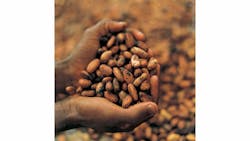New CARE Report Highlights Cocoa Life's Positive Impact On Women's Empowerment
DEERFIELD, Ill., Oct. 20, 2016 (GLOBE NEWSWIRE) -- Following the publication of CARE International's favorable assessment of Cocoa Life in Ghana and Côte d'Ivoire, Mondelēz International announced that it would further strengthen the women's empowerment initiatives of its signature cocoa sustainability program. These enhancements will build on the company's eight years of experience mainstreaming gender equality in cocoa production through Cocoa Life, a $400 million, 10-year effort launched in 2012, based on its successful Cadbury Cocoa Partnership.
The CARE assessment highlighted the benefits that Cocoa Life has had on increasing women's influence in cocoa production across the program's focus areas of farming, community, livelihoods, youth and environment, including:
- Increased cocoa yield from giving women better access to training in Good Agricultural Practices.
- Improved financial literacy and resilience as well as increased household income through access to finance. Increased household income is used to invest in agricultural inputs, to hire labor and to fund school tuition fees.
- More active participation by women in community-level decision-making bodies, such as the Community Development Committees and the Community Action Planning process.
- Women extension volunteers program shown to be instrumental in promoting access to finance, community mobilization and promoting Good Agricultural Practices.
"Empowering women benefits everyone and is essential if cocoa communities are to thrive, and that's why it's a cross-cutting theme in our Cocoa Life program," said Christine McGrath, Vice President of Sustainability, Cocoa Life and External Affairs at Mondelēz International. "CARE's assessment validates our strategy to empower women as a way to improve agricultural productivity, build livelihoods and help communities to thrive."
"As an implementing partner on gender issues in Cocoa Life, I've witnessed how training women in Good Agricultural Practices, the business of farming and group management mobilizes them to become confident role models," said Rose Mensah-Kutin, Ph.D., Director, West Africa Regional Office, ABANTU for Development. "The CARE report reinforces how empowering women is a catalyst for change in cocoa-growing communities, so I'm excited by Cocoa Life's increased emphasis on its programming."
"Cocoa farming is viewed as a male activity in most countries, but in reality, it's the women who do a lot of the work that's critical to the quality of the final product," said Tom Sessions, Head of Strategic Partnerships at CARE. "The partnership between CARE and Mondelēz International has addressed key challenges facing women working on cocoa farms, arising from the community, as well as from within their families. This research highlights the importance of strengthening women's leadership, so that they can participate equitably in the cocoa value chain and earn a sustainable income, whilst simultaneously strengthening the value chain."
Strengthening Women's Empowerment Initiatives
Based on CARE's recommendations, Cocoa Life will strengthen interventions to empower women, including:
- Evolving the Women Extension Volunteer model (or similar), which will be progressively rolled out in all origin countries
- Increasing women's access to finance, farm inputs, land ownership and membership of producer groups and cooperatives
- Promoting leadership positions for women as part of the Community Development Committees and Community Action Plan processes, including a floor of 30 percent for women representatives in the process
To learn more about Cocoa Life's approach to strengthening women's empowerment in cocoa communities, please read the report: "Cocoa Life: a transformative approach for women's empowerment in cocoa communities."
